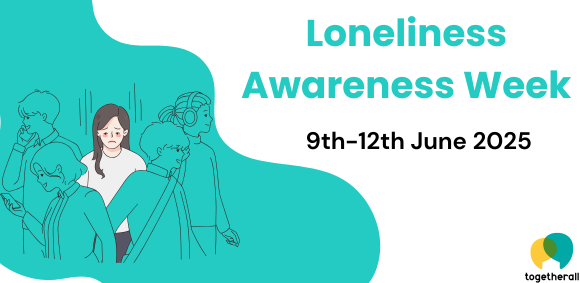Loneliness awareness week is a weeklong campaign that raises awareness about loneliness and encourages people to make connections. This week is a time to talk about something that many people experience but don’t always share – loneliness. Perhaps you’ve experienced loneliness yourself, or maybe you know someone who has. Let’s use this week to learn more about this issue and find ways to support each other.
What is loneliness?
People often confuse being alone with feeling lonely, but they are entirely different. Many people enjoy being alone as it provides time to relax, reflect and recharge. Loneliness, however, is that uncomfortable feeling of being isolated and disconnected even when surrounded by other people. Additionally, there is the desire to connect with others but sometimes feeling unsure how to do so.
Loneliness can happen for countless reason, maybe you just started a new course and don’t know anyone yet, or maybe you have drifted apart from loved ones. Whatever the reason, navigating loneliness can be challenging, but it’s crucial to remember that you are not alone in feeling this way.
The impact of loneliness
Loneliness is not just an emotional experience; it has significant consequences for both physical and mental health including:
- Anxiety
- Depression
- Increased risk of heart disease, stroke, and dementia
- Weakened immune system.
- Sleep issues.
- Suicidal thoughts
- Substance abuse
- Type 2 diabetes
How you can help
Let’s dive deeper into how you can help yourself or others feel less lonely:
| For yourself | For others |
| – Reach out to friends and family – a simple text or phone call can make a big difference in maintaining connections. – Join clubs or attend community groups. – Volunteering can help create a sense of purpose. – Engage with people in your community. – Dedicate time to work, study or hobbies. – Use technology to contact with people online, there are lots of communities for all types of hobbies and interests. | – Check in with family, friends, and colleagues. – Volunteering can also help others struggling with loneliness. For example you could consider becoming a befriender, to help those struggling with loneliness due to mobility, illness or other barriers. Offering up your time can help you both feel less lonely. – Invite others to social gatherings. |
In conclusion, loneliness awareness week reminds us that loneliness is a common experience and impacts people of all ages. By raising awareness and encouraging connection, we can combat isolation and make a real difference in the lives of those who are struggling.
Support and Resources for CAW Students
As a student of The College of Animal Welfare, you get FREE access to a wide variety of resources and support via the togetherall app; there is a great short online course on how to manage social anxiety. Togetherall also has forums so you can discuss any worries with others, and access to trained counsellors 24/7. If you haven’t set up an account, you can do so FREE of charge with your CAW email address.
If you are struggling with loneliness or any aspect of college life, remember you can access up to six confidential counselling sessions free of charge: full details can be found here.

